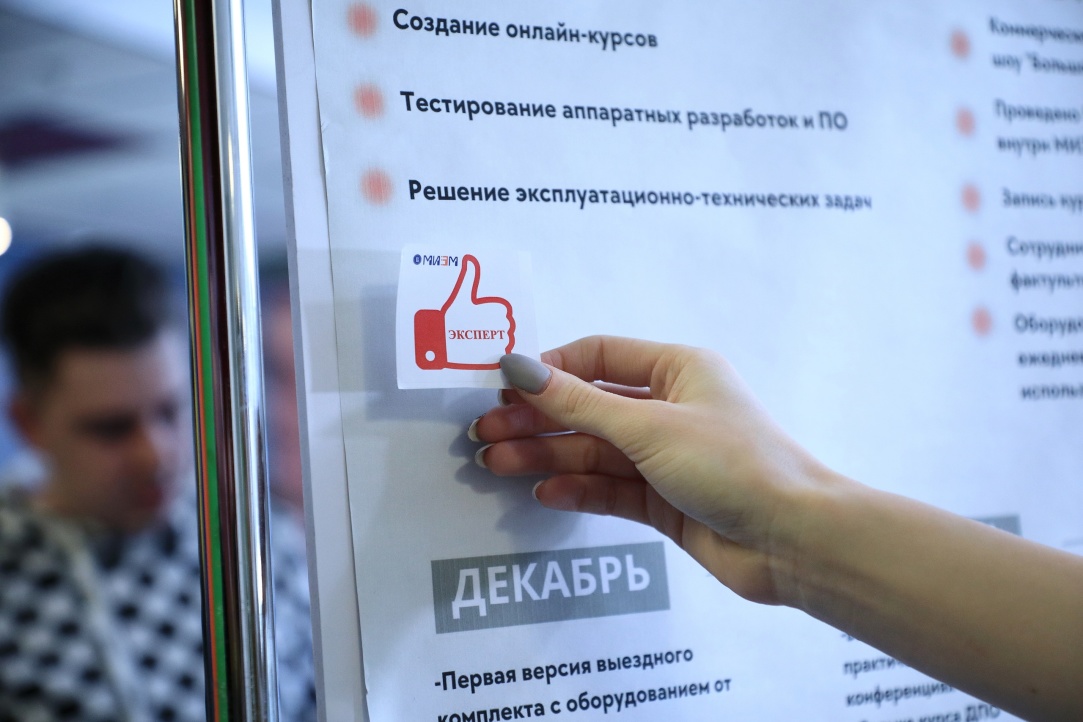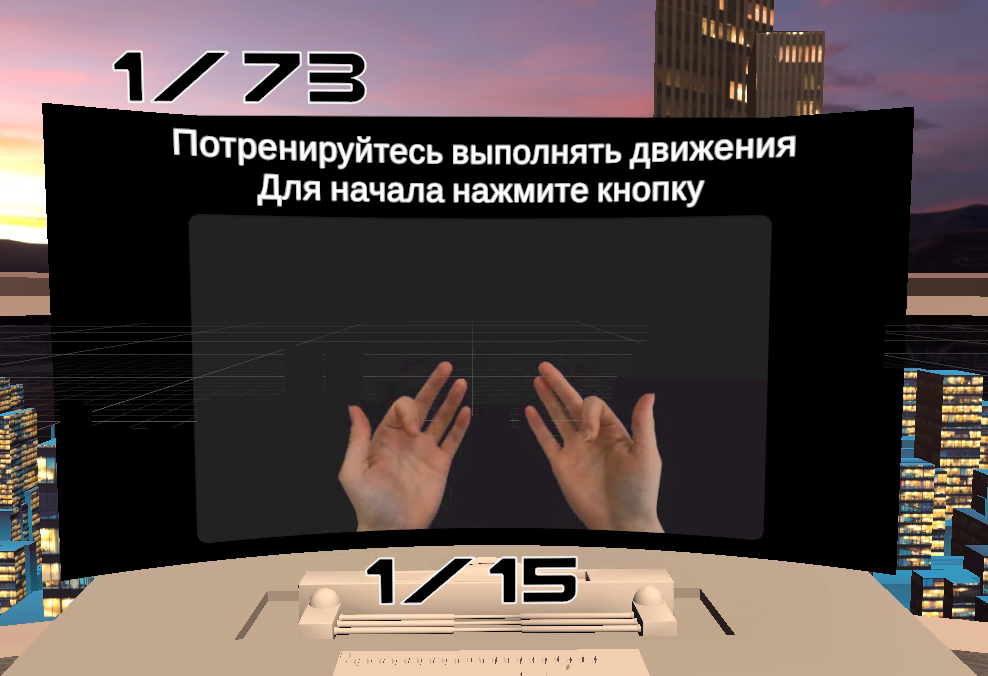Smart Medicine, Libration Points and Electromyographic Bracelets: MIEM Students Present Their Projects

In February, a two-day poster session - the second checkpoint of the project life cycle - was held at the HSE MIEM. The participants prepared colorful posters, talked with experts and MIEM students and received well-deserved plaudits. Here, the HSE News Service looks at some student projects.
Virtual training environment for restoring fine motor skills in people with disabilities
Head: Alexey Rolich
The project is aimed at developing a system that will learn to predict the finger movements of a virtual prosthesis for people with an amputated forearm. The system consists of a VR environment and an electromyographic (EMG) bracelet. The electromyographic bracelet uses sensors to record the electrical activity of muscles and converts this data into input information for augmented reality devices.
Matvey Antonov, 3rd-year student of the programme in Applied Mathematics, shared some details of the project.

Matvey Antonov
‘At the techshow, we met researchers from the HSE Centre for Bioelectric Interfaces. They wanted to create a virtual training environment to restore fine motor skills in people with disabilities, and we agreed to help.
After amputation of the forearm, a person has active muscles that are responsible for finger movements. If you collect data on the activation of these muscles, you can train a neural network to predict finger movements of a virtual prosthesis. This involves the following steps:
1. The patient puts on virtual reality glasses and sees both hands, seeing the amputated hand as his/her healthy one, but mirrored.
2. The patient sees a demonstration of gestures with two hands.
3. The patient repeats them with the healthy and the virtual hand, which is a continuation of the limb.
4. The EMG bracelet registers the activity of the limb muscles.

Following this, the neural network is trained, and as a result, the patient sees the fingers of the virtual hand moving.
We have already developed the VR environment for data collection, now we need to create an EMG bracelet. We have prototypes of individual electrodes and boards, which we made ourselves.
After creating the bracelet, we will link everything into one data collection system, which can be uploaded into real prostheses in the future.’
Smart Medicine
Head: Ksenia Fimina
The Smart Medicine project was represented at MIEM for the fourth consecutive year and, as always, attracted the attention of experts and students. Anna Gordeeva, 3rd-year student of the programme in Applied Mathematics, told us more.

Anna Gordeeva
‘Our team is developing a software product for the statistical analysis of medical data. It is an intelligent assistant for pharmacologists and medical researchers.
To analyze medical data, medical workers have to use different programs, understand their interfaces and sometimes still manually write functions for calculations.

Our product solves these problems. To work with it, the user does not need to be a programmer, since the interface is designed to be user-friendly. A medical researcher just needs to select one of the modules, upload the data and specify the necessary settings. ‘Smart Medicine’ currently includes five modules: Descriptive analysis, Bioequivalence, Predictive models, Comparative analysis and Cluster analysis. The research results are presented in the form of interactive dashboards.

Experts in the field of medicine have already reviewed test versions of the product and have provided us with positive feedback and recommendations. The product is already in a final version, so now we are working on promoting its use. We have created a telegram channel where we can share information about our system.’
Application of Machine Learning Methods to Calculate Orbits Around Libration Points of a Restricted Three-body Problem
Head: Sergey Aksenov
The project team creates an algorithm that calculates orbits around libration points in the Sun—Earth system. The project aims to expand the map of initial conditions using machine learning methods. Timofey Protasov, 3rd-year student of the programme in Information Science and Computation Technology, shares the project details.

Timofey Protasov
‘Libration points, or Lagrange points, are points of space in which the gravitational forces of two massive bodies rotating around a common barycenter (for example, the Sun and the Earth) are balanced by centrifugal force. They are stationary solutions of the restricted three-body problem. There are five libration points in space. For example, orbits around the L1 point allow space research vehicles to continuously observe of the Sun.
To calculate orbits, it is important to know the initial conditions (position in space and speed) of the vehicle that would lead it to orbit. There are certain methods for calculating these initial conditions and orbits, but they work in a limited area of space, that is, they give a limited map of the initial conditions. We use machine learning to expand the boundaries of the initial conditions map.
The project has been in progress for more than a year. Last year, the team pursued similar goals and achieved an intermediate result: the students found suitable initial conditions and calculated orbits within the same boundaries as the cutting-plane method, but using a machine learning model. The result is the same, but the way of achieving it is different.
This allows us to rely on the achieved results, since the work we have done is also a kind of result. Using models in this task is much more difficult than running a single line of code. A lot of intermediate steps are required, all of which were carried out and investigated last year.
It’s hard to choose a machine learning model and to interpret the obtained results. Different methods give different results, which are difficult to assess as ‘better’ or ‘worse’. As a result, this has become our main task: to make a decision on the prevalence of one approach over another.’
Text by Valeria Nemna, 4th-year student of MIEM programme in Applied Mathematics
See also:
Real Tasks and Direct Interaction with Employers: HSE School of Foreign Languages Holds Poster Session
For the second time, the HSE School of Foreign Languages has held a defence of specialised projects developed by fourth-year students of the Bachelor’s Programme in Foreign Languages and Intercultural Communication. Representatives of major companies and organisations that support the school’s project activities gathered to evaluate the projects during a poster session.
Scientarium: Integrating Student Scientific Associations and HSE University Projects
In early July, the Voronovo Study Centre hosted Scientarium, an off-site session for representatives of HSE University student research communities organised by the university’s Centre for Student Academic Development and Unit for the Popularisation of Science. More than 50 students from 10 scientific student associations and three campuses took part.
From Ingenious Fungi to Post-feminism: HSE University Hosts Season’s Last Science Battles Semi-Final
Season VI of Science Battles at HSE University is entering the homestretch. The June semi-final determined the list of finalists and helped many viewers choose their favourites. This time, young researchers decided to figure out how to conduct a police lineup without destroying a person’s life, as well as how to improve a child’s academic performance without instilling neurotic perfectionism. They also found out that fungi and mould help heal scars and save the environment, and that adherents of post-feminism have very mixed feelings about their own images on TikTok.
Submarine and French Confectioner's Shop—Winners of the Top Class Research Competition Announced
This year’s final stage of Top Class, the All-Russian Competition of Schoolchildren’s Research and Projects, held by HSE University, has come to a close. About a thousand 8th—11th graders from 7 countries and 69 regions of Russia participated in the contest. The winners and runners-up were announced at the closing ceremony in the HSE Cultural Centre. They received special prizes from partner companies.
Winning Research Initiative Projects to be Implemented by the End of 2022
In April, the results of the Research Initiative student project competition were announced at HSE University. Twenty-two team applications were submitted by students of 20 different fields of study at HSE University’s campuses in Moscow, Perm, and Nizhny Novgorod. Based on the results of expert assessment, the competition committee approved 17 interdisciplinary projects to be implemented by December 2022.
HSE University Holds School of Snow in Perm Region
On February 15–17, the Winter SOS (School of Snow) was held at the Zhebrei ski resort. The event was organised by the HSE Perm Tourist Club and the Student and Alumni Centre. In addition to learning to ski and snowboard, students from all HSE University campuses developed and defended projects focused on the development of domestic tourism in their regions. SOS participants shared their impressions with the HSE News Service.
Registration Opens for ‘Research Initiative’ Team Project Competition
The HSE Centre for Student Academic Development has started accepting applications for the third ‘Research Initiative’ student team research project competition. Bachelor’s and master’s students from all HSE campuses are eligible to participate. The competition gives students an opportunity to not only take on research roles, but also to try their hand at working as academic managers and supervisors of a small research team. Registration will remain open until February 28.
HSE Master’s Students on the Professions of the Future
Students in the Transmedia Production in Digital Industries Master’s programme have done a project on the professions of the future. Covering trends and key professions, the project helps students assess potential academic trajectories. The main part of the project is a non-fiction book ‘What’s Next? Professions of the Future’, which is based on the ‘Androids and Electric Sheep’ podcast by Forbes and X5 Group. The book has been published on the Ridero platform.
‘Our Distinction Is Our Core Areas of Research’
In his interview for the HSE LooK, Evgenii A. Krouk, the Acting Director of HSE Tikhonov Moscow Institute of Electronics and Mathematics, talks about the distinctive features that set the institute apart, the place of project-based learning on the curriculum, research areas with the highest potential, and his vision for HSE MIEM future development.
Gifts under the Christmas Tree: How Student Startups Can Surprise You
One of the most popular minors that HSE University students can choose in their second and third years is 'Startup from Scratch'. With the teachers’ support, students launch their own business projects, including startups for the production and sale of souvenirs and cosmetics, which can serve as unique New Year gifts.


